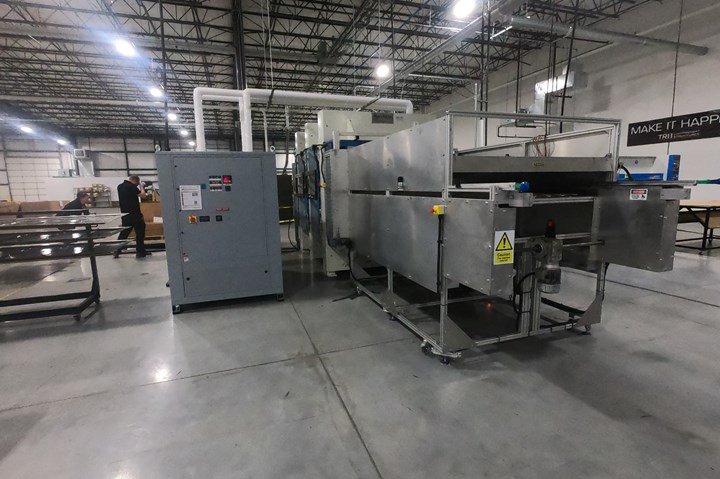TRB Lightweight Structures develops under-vehicle protection plates for electric vehicles
Plates are composed of a sandwich construction of advanced materials and toughened TRB resins for doubled impact absorption rates and halved weight.

TRB’s fast press cure (FPC), developed specifically for thermoset materials. Photo Credit: TRB Lightweight Structures
TRB Lightweight Structures (TRB, Huntingdon, U.K.) has developed a composite under-vehicle protection plate that is reported to dramatically improves impact absorption while decreasing weight. These panels have been created from a combination of materials and a proprietary, toughened TRB resin, using a manufacturing process that enables production at high volume; this cost-effective process, which was developed in parallel with this new solution, is now operating in both North America and the U.K., TRB says.
The protection plates use a sandwich construction of advanced materials, layered intelligently to provide varying impact absorption strengths depending on location. Testing has shown impact absorption rates that are typically doubled compared with best-in-class steel solutions, while halving the weight. TRB says the plates can be painted although, unlike steel, paint is not required for corrosion protection, while the low weight construction simplifies installation and replacement.
“Skateboard chassis designs require better battery protection for both on and off-road vehicles,” says Richard Holland, managing director of TRB Lightweight Structures. “Our approach leverages decades of knowledge in the development and testing of materials and manufacturing methods, resulting in a cost-effective solution for automotive components that decreases weight and increases performance.”
TRB will be showcasing its products and technology at The Battery Show Europe in Stuttgart, Germany, starting on November 30th, 2021.
Related Content
-
Automotive chassis components lighten up with composites
Composite and hybrid components reduce mass, increase functionality on electric and conventional passenger vehicles.
-
Exel Composites supplies fiberglass profiles for Foton electric buses
Partnership with Chinese automotive manufacturer will see the implementation of pultruded profiles in various bus models, backed by weight savings, complex geometries and long life.
-
Bcomp ampliTex makes appearance in Cupra EV Cup Bucket seats
The entire Cupra Born VZ line-up features all-natural fiber front seats that highlight functionality, aesthetics and reduced CO2 emissions.












